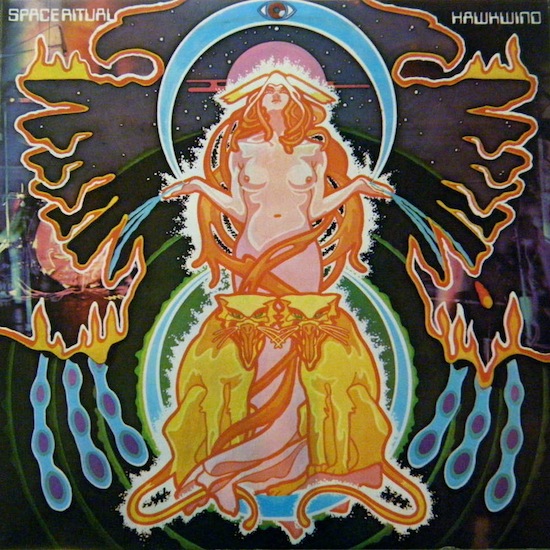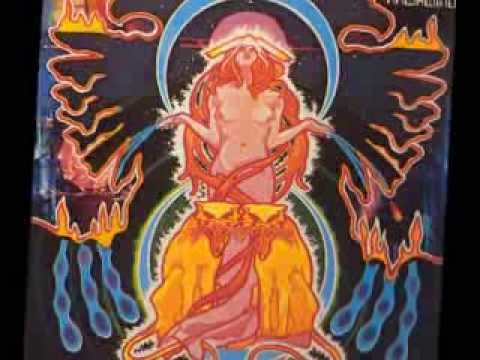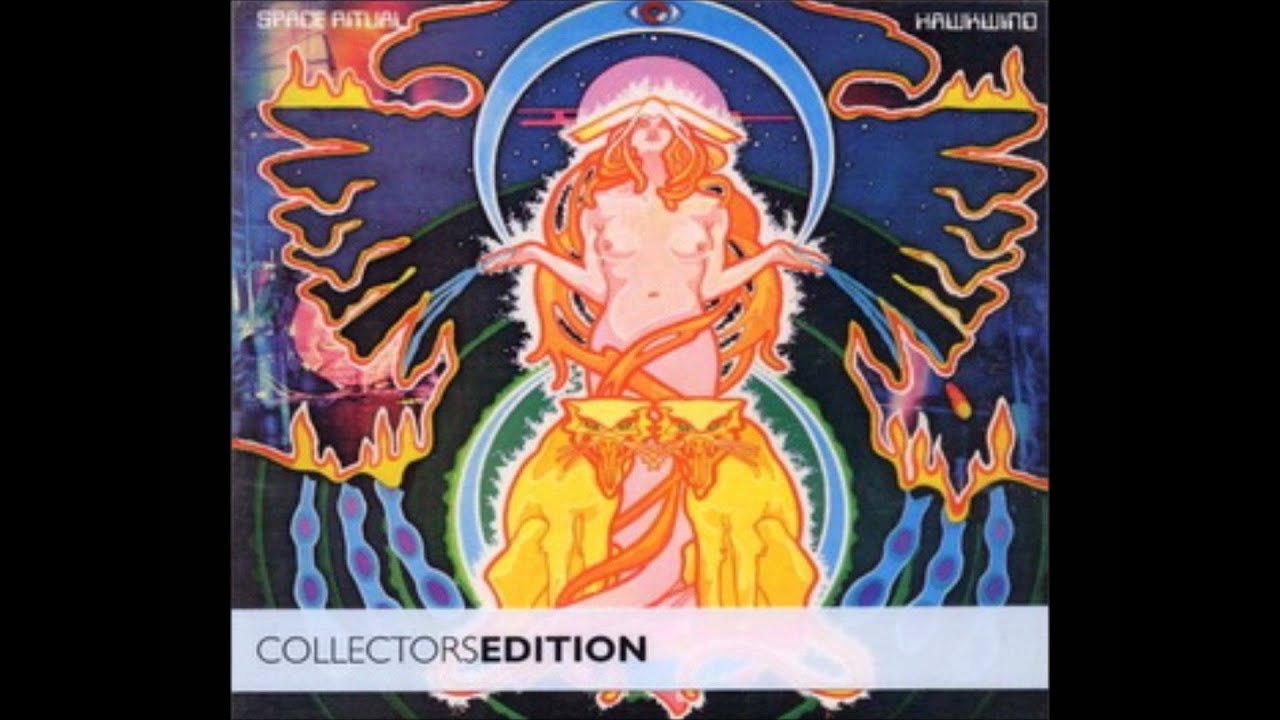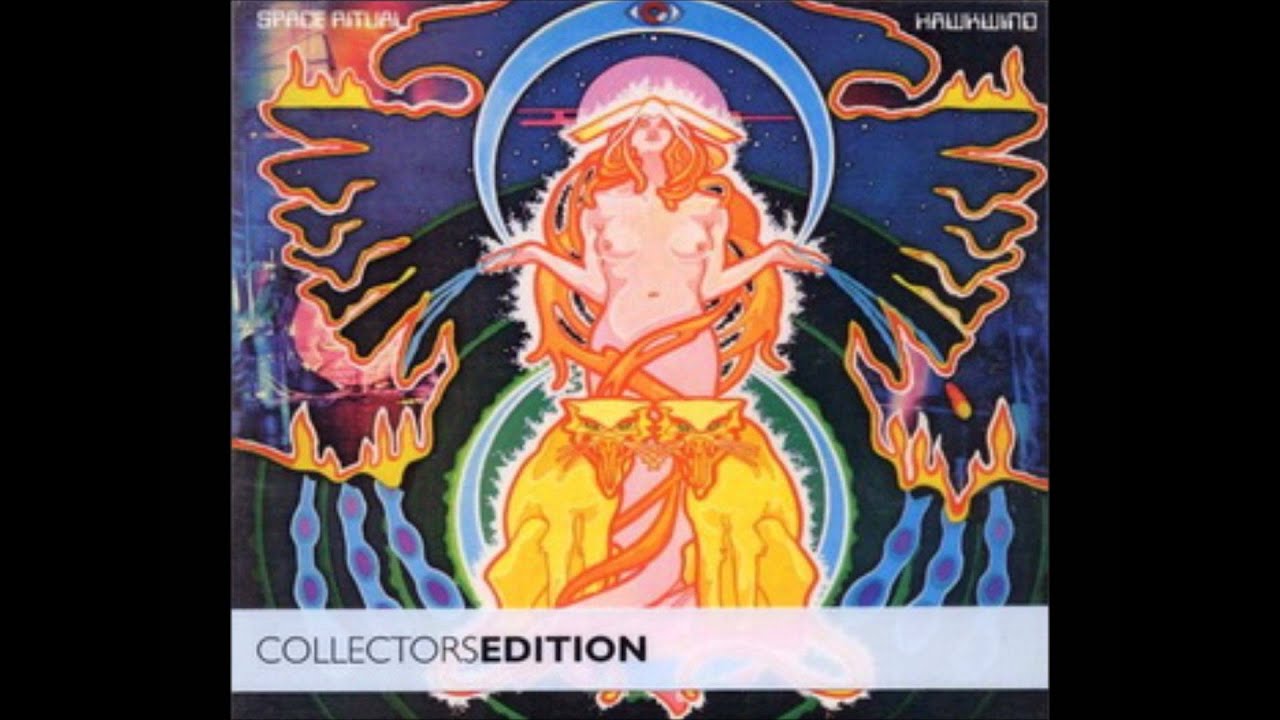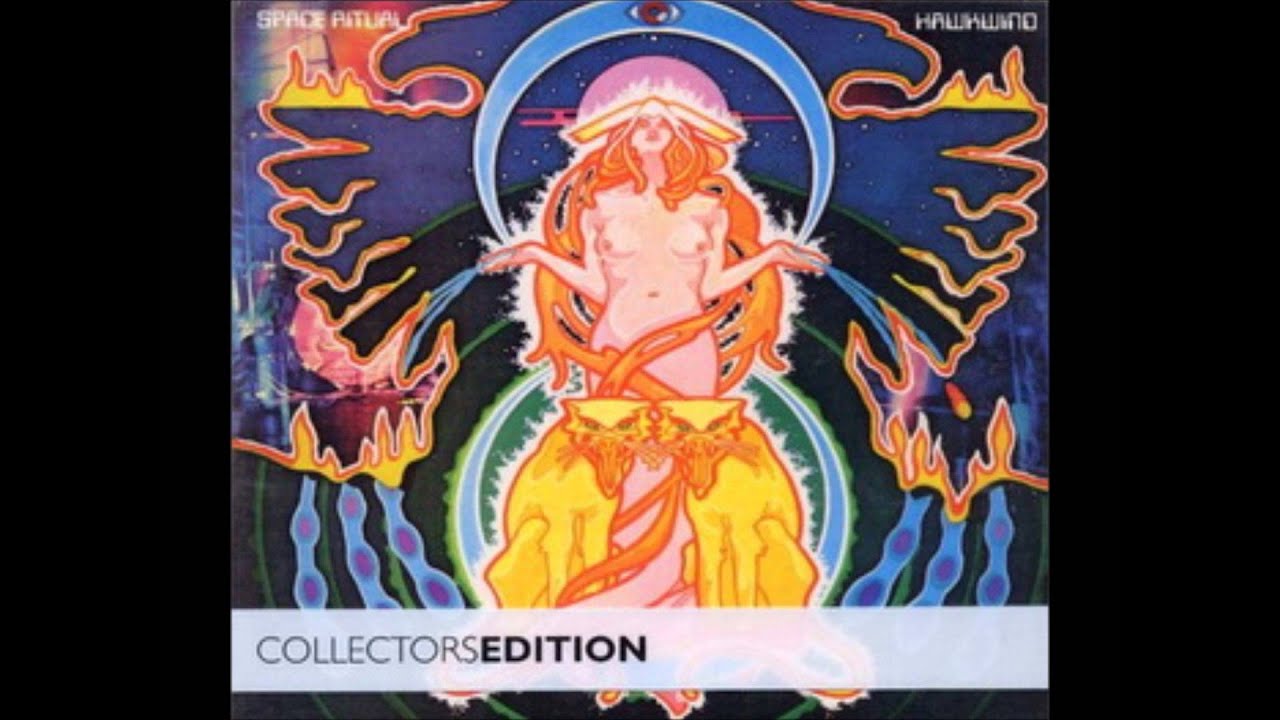Released in May 1973, Space Ritual is a unique piece of British music history. Across its 88 minutes, it delivers one of the most mind-bending, trance-inducing and flat-out immersive experiences available for your ears and brain. It’s one hell of a trip and certainly the finest heavy psychedelic album produced in this country. Yet for all its influence on generations of star-faring mantric music makers that have followed in its wake, it still remains an under-acknowledged record in the great rock canon.
Of course, this isn’t just an issue for Space Ritual, but also for Hawkwind as a band. Yes, everybody knows the name and they’re probably familiar with the wheezing space boogie of ‘Silver Machine’, but Hawkwind suffer in the popular and critical imagination by being pigeon-holed as sci-fi obsessed hippy throwbacks beloved by cheesecloth-wearing stoners in greatcoats. And while there’s certainly some truth in this perception, it obscures the fact that throughout the 1970s, Hawkwind were a musical and conceptual powerhouse with a series of releases that both parallels and rivals the revolutionary rock coming out of Germany during the same period.
Tellingly, Hawkwind were one of the few UK bands actively listening to and being influenced by the likes of Can, Neu! and Amon Düül II, which perhaps explains why their output sounds so singular when compared with the contemporary British music scene of the time – with a similar year zero, anything goes mentality to the key German bands, Hawkwind took the heavier end of the 60s underground sound as a starting point and created a monolithic concoction of garage rock, primitive electronics and free jazz, with the power of repetition and the riff always to the fore.
Space Ritual is the absolute epitome of this sound, a raging black slab of proto-punk blazing a trail through the vastness of the cosmos, the sheer exhilaration of its musical brute force counter-balanced lyrically by an unsentimental vision of our place in the universe. Experimental but never inaccessible, dense as hell but never dumb, Space Ritual still sounds like nothing else on Earth.
It’s also worth noting that this album wasn’t a niche concern in 1973. It got to number nine in the UK charts (Hawkwind’s only top ten LP), and was culled from a series of shows that really pushed the boundaries of what live rock music could be in terms of an audio-visual event. ‘Silver Machine’ might appear in retrospect to be some kind of fluky hit from the previous year, but as Lemmy says in Carol Clerk’s Saga of Hawkwind biog, “…in the freak scene, we were fucking huge”. And the success of the single was what enabled to Hawkwind to finance these ground-breaking shows.
Housed in a non-more-awesome day-glo fold-out sleeve depicting a hermaphrodite messiah figure flanked by two heraldic star cats, Space Ritual presents the recording of a show in its (near) entirety – this is in contrast to pretty much every other live album of the time, which tended to be an excuse to re-heat a band’s most popular songs and subject the listener to interminable drum solos. It also features at least an album’s worth of material unavailable elsewhere i.e. the versions on Space Ritual are the definitive versions, not just live takes of previously-recorded songs. Much of the rest of the material comes from Doremi Fasol Latido, and with the possible exception of one track (‘Space Is Deep’), these songs are greatly improved by the experience.
So, to the music. As I said earlier, the first thing you notice about Space Ritual is that it just doesn’t sound like anything else you’ve heard before. I remember as a callow 13-year-old getting it out of the local library and being both amazed and rather flummoxed by the noise coming out of my Fidelity stereo – muggy, almost claustrophobic, but also insistent and driving, with disquieting spoken word pieces that enhanced the feeling of listening in to a secret transmission from a parallel dimension.
Fading up out of a ghostly echo of ‘Thus Spake Zarathustra’ (used to iconic effect in 2001: A Space Odyssey), ‘Earth Calling’ is a revving of the engines before take-off, screams of what sounds like alien glossolalia gradually subsumed by the rising rumble of bass, drums and guitar. There’s a pause… and then the planet-bestriding riff of ‘Born To Go’ kicks in. The drums pile on top of it, and we’re off on our epic voyage through eternal night.
At ten minutes of relentless forward motion, ‘Born To Go’ is pretty much Hawkwind’s definitive song from this period, containing all the vital components that made them sound so different from everybody else. Hawkwind at this point in their history may not have been manned by the world’s most technically gifted musicians, but they featured players who had markedly individual takes on how to use their instruments, which in combination created something very special indeed.
De facto Hawkleader Dave Brock’s choppy, almost mechanical guitar playing is the single most recognisable element of the band’s sound, rendering ‘Born To Go’’s pulsating, mantric riff as a series of controlled detonations, blasting “a nuclear way through space”. Brock doesn’t take many solos, but when he peels off from the main theme and hits the wah wah pedal, his playing is utterly transporting, a blinding glimpse of the sun against the blackness of the void.
Brock’s main sparring partner on Space Ritual is future Motorhead supremo Lemmy, whose muscular but melodic bass playing powers ‘Born To Go’ along, as it does most of the other songs on the album. Lemmy has often spoken of the musical interplay between himself and Brock as being almost telepathic, and that sense of the whole group being locked in a magical zone of musical confluence permeates both this song and the rest of the LP.
On the full-on space rock tracks such as ‘Born To Go’, the contribution in particular of drummer Simon King is immense. His style is sometimes likened to the Germanic motorik beat, but his playing is a good deal more primal than that – while Klaus Dinger sounds like he’s propelling Neu! into a gleaming technocratic future, King sits at the heart of a dirty engine room, battering his kit in a fight to maintain course on a mission through unknown skies.
The other musonauts on the album are Nik Turner (sax and flute), Del Dettmar (synths) and DikMik (audio generator), all of whom are key to creating Space Ritual’s unique sound. Throughout the show, Turner alternates between playing set melodies and abstract squalls of noise, sometimes at odds with what everybody else is playing, but in a way that’s utterly integral to the conjuration of the album’s otherworldly atmosphere. Similarly, Dettmar and DikMik cloak the songs in an ambient wash of analogue electronics, with mysterious whooshes and bleeps occasionally breaking through like the unheeded commands of the ship’s computer. Hawkwind’s use of keys during this period is similar in concept (if not execution) to Can’s Irmin Schmidt, clearly vital to the sound, but not always obvious how they’re making it.
The final essential element of the Space Ritual experience is of course the vocals, which are shared out between Brock, Turner, Lemmy, and the final member of the crew, the inimitable Bob Calvert. There’s a rough, almost atonal, and yes, ritualistic quality to much of the singing here, something which is again well-illustrated by ‘Born To Go’ – Turner takes the lead, injecting both a defiant and slightly desperate edge to the lines, his elongation of ‘realiiiitteeeeeeeeeee’ suggestive of someone being slowly torn apart after ejection into the vacuum of space.
‘Born To Go’ eventually surrenders the controls and transitions into the more sombre and reflective ‘Down Through The Night’, buoyed along by another fluid bassline from Lemmy. As with all the album (except the very end), there’s practically no crowd noise between the songs, which again adds to the sense of participating in a clandestine ceremony rather than just a live celebration of a band’s back catalogue.
‘Lord Of Light’ is the most upbeat and pop-like song on the album, Brock’s confident riffing and commanding vocal again ably supported by Lemmy’s rock steady undertow and some of Turner’s most cogent sax playing, while ‘Space Is Deep’ is a ballad to the void that gradually blossoms into a starburst of colour before seguing into an (uncredited) extract from In Search Of Space’s ‘You Know You’re Only Dreaming’, its soft wordless chanting bringing the song to a stately conclusion. Both tracks show a compositional subtlety that often gets overlooked in discussions about Hawkwind, but which sets them apart from modern groups fixated only on the highs of interstellar overdrive.
‘Orgone Accumulator’ sees the band hit the boogie button, delivering a space trucking, head nodding jam backing one of Calvert’s daftest lyrics and featuring his only actual singing turn on the album, his measured and aloof monotone an amusing contrast to what’s gone before. It’s brilliantly moronic, and as it loosens up towards the end, downright funky thanks once again to Mr Lemmy Kilmister. And Brainstorm – set to become a mainstay of the band’s live repertoire – is here still fresh in the set, its relentless two chord riff hammered out seemingly to infinity and beyond. Brainstorm’s urban angst, aggressive vocals and primal energy also make it Exhibit A in terms of the group’s influence on the punk scene set to explode a few years later out of the same west London milieu as Hawkwind themselves.
‘Seven By Seven’ is a downbeat, minor key meditation on the heaviness of being – “Lost am I in this world of timelessness and woe” being a pretty definitive opening line – while ‘Time We Left This World Today’ has perhaps one of Dave Brock’s finest riffs and a fantastic call and response vocal that sounds like its being performed by some paranoid gospel congregation.
But like the well-planned piece of theatre that Space Ritual is, it’s all building up to the big finish… On In Search Of Space, ‘Master Of The Universe’ was a cleverly arranged cosmic melodrama that slowly built in power by using contrasting guitar tones and breakdowns to near-silence. But on Space Ritual, it sounds like the Hawkcraft and its crew are being sucked into a super massive black hole, racing at light speed towards a crushing singularity. Simon King beats his drums like a man trying to smash his way through the ship’s hull, while Brock and Lemmy’s pulverising riff moves from crescendo to crescendo and the entire backline of electronics is turned up to brain-frying intensity.
Taken purely on its merits as a sonic tour de force, Space Ritual is a remarkable achievement. But there’s a fascinating alternate reading of the album where the music is only half the story. The sheer rock power of Space Ritual is crucially underpinned by a feeling of existential frustration, even dread, that grounds it in the fears and concerns of the times it was conceived and created in. Much of this resonance is derived from the spoken word pieces that occur throughout the album and ensure that Space Ritual isn’t some Bowie-esque vision of meeting the golden people in the sky. Rather, it’s about escaping the clutches of an oppressive society while confronting the blankness of the cold space beyond the Earth.
In the early 70s, the UK felt like a country teetering on the brink of political dissolution and social collapse, a world that’s hard for us to grasp from the comparative comfort of the 21st Century. But while nostalgia-driven TV programming likes to depict this time as an endless parade of bad hair, space hoppers and cheerfully racist sitcoms, the reality was a good deal more frightening.
The UK economy was barely functioning thanks to chronic mismanagement and a series of general strikes, leaving mountains of uncollected rubbish to rot in the heat. Revolution was genuinely in the air, whether it was the rumoured military coup about to overthrow the government or the operations of the Baader Meinhof-influenced Angry Brigade. And all of this was happening against the backdrop of a renewed IRA bombing campaign.
But it wasn’t just Britain. The whole world was caught in the vice of an increasingly chilly Cold War, with the threat of nuclear annihilation at any moment seeming gut-wrenchingly real. Yet that was just one of the roads to doomsday that mankind seemed to be busily creating – the early 70s also saw the first global oil crisis, growing fears about an uncontrollable population explosion, and the dawning realisation that pollution was slowly killing the land.
While Brock and crew masterminded the musical side of things, Bob Calvert and science fantasy writer Michael Moorcock – a long-standing Hawkwind associate – put together an over-arching concept that would unite existing material and frame it in the context of the new wave sci-fi movement that Moorcock had been instrumental in developing. New wave sci-fi abandoned the notion that the genre should just be cowboys and Indians in space, but should instead examine modern day socio-psychoses and concentrate on the exploration of ‘inner space’ (a term coined by one of its key proponents, JG Ballard).
So while Hawkwind may trade in a lot of traditional sci-fi imagery, it’s very much reflected through the dark glass of contemporary events and concerns – tracks such as ‘Born To Go’, ‘Brainstorm’ and ‘Time We Left’ are all about breaking free from the death throes of a damaged world. Space Ritual’s spoken word pieces – coldly delivered by Calvert like a detached and dispassionate android – magnify this sense of trepidation and unease, and also act as effective counterpoints to the big riffs that crash in at their conclusion.
‘The Awakening’ has Calvert mournfully musing about the bleak realities of deep space travel, his crew “suspended cool in their tombs of sleep” in contrast to the bright colonialist future depicted by the likes of Star Trek. But it’s ‘The Black Corridor’ which is the real key text here, the opening words from Moorcock’s novel of the same name: “Space is infinite. It is dark… Stars occupy minute areas of space. They are clustered a few billion here. A few billion there. As if seeking consolation in numbers. Space does not care.” (This novel, which again tells the story of a desperate group of people escaping from a disintegrating Earth, had clearly been a big influence on the band, these words having already been paraphrased by Brock in the lyrics to ‘Space Is Deep’).
’10 Seconds Of Forever’ is filled with imagery worthy of Ballard himself, Calvert alternating between incisiveness and reverie as he delivers lines such as, “In the second second of forever, I thought of a pair of broken shades lying on the tarmac.” However, it’s ‘Sonic Attack’ which is the best known of these spoken performances, an arch parody of the government information films that attempted to prepare us for mass vaporisation in the event of a nuclear strike: “If you are making love, it is imperative to bring all bodies to orgasm simultaneously, do not waste time blocking your ears!” It’s very funny, but also rather chilling in its prescience, its mantra of “Do not panic. Think only of yourself” sounding increasingly like a coalition broadcast.
The album ends with the grim ‘Welcome To The Future’, “the dehydrated lands” with “oceans in a labelled can”, before the Hawkcraft’s mighty engines fire one last time, though whether it’s to finally escape into the depths of a galaxy far far away or to crash-land back down to Earth remains unclear.
Space Ritual is both a timeless piece of psychedelic heaviosity and a vivid time capsule of a culture on the cusp of chaos. Its vision of space travel is entirely consistent with when it was made, the Hawkcraft leaving a dirty rent in the fabric of spacetime as it struggles to break free from the Earth’s gravitational pull. It still feels to me like an almost miraculous album, a band at the height of their powers performing their most audacious shows, perfectly captured as an ultimate statement of intent and a living document for future generations. Any band following in the space rock tradition must bow down before it, and in the interests of cosmic justice, so should the arbiters of the critical consensus, and finally recognise Space Ritual as one of the major works of the 1970s.

